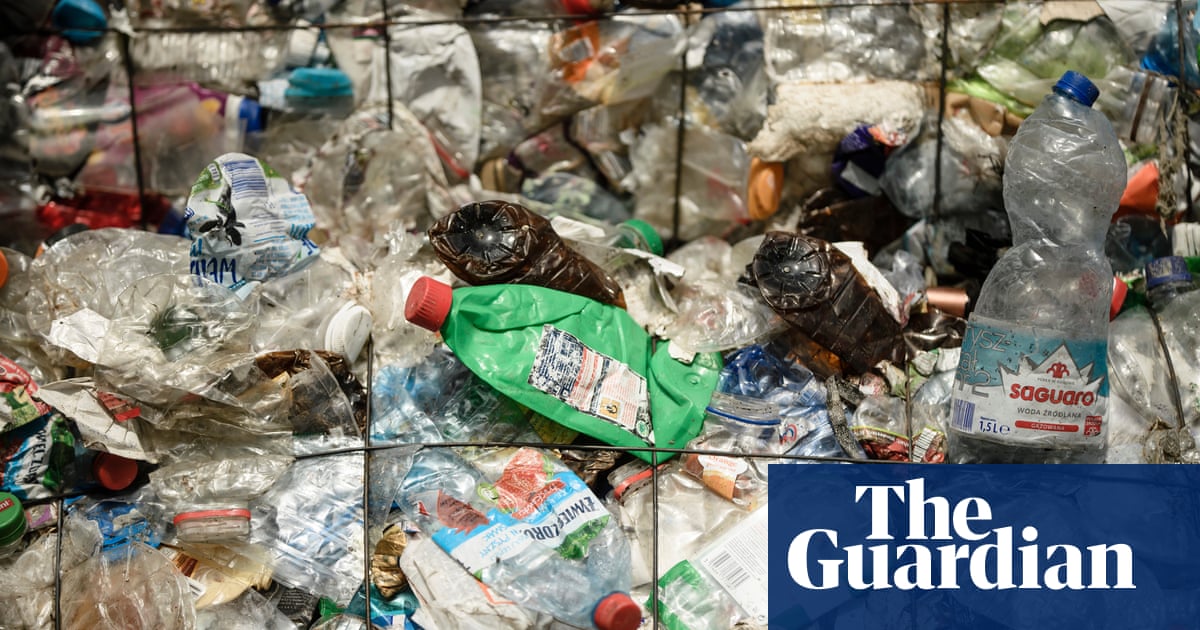- cross-posted to:
- worldnews@lemmy.ml
- cross-posted to:
- worldnews@lemmy.ml
Plastic producers have known for more than 30 years that recycling is not an economically or technically feasible plastic waste management solution. That has not stopped them from promoting it, according to a new report.
“The companies lied,” said Richard Wiles, president of fossil-fuel accountability advocacy group the Center for Climate Integrity (CCI), which published the report. “It’s time to hold them accountable for the damage they’ve caused.”
I worked in packaging for 20 years. A bottle CAN be recycled indefinitely… if it’s made from GLASS.
Source: I worked 8 years for a glass bottle manufacturer.The real key is local bottling where local production isn’t possible.
Ship vats of Coca-Cola syrup to the 200 largest cities (more or less) in North America and create local bottle circulation.
Spice it up with local bottle designs or recycling marks. Now you’ve got novelty sales, collector sales, eco-conscious sales, ‘support local’ sales…
I am so confused. Isn’t that the coca cola model? Each area has some coca cola bottling franchise that services them, and they already have regional differences.
As far as I know local bottlers have been a thing for a long time yes. I remember TV ads for soda with a tack on slogan at the end from the bottling company. “Bottled by the good guys at Kalil”
Or aluminum
Aluminum has a plastic liner
Which is effectively not there, by weight or area. Also, aluminium is the most efficiently recycleable material we know of.
Too bad most of those bottles got replaced with plastic completely disregarding the impact of the environment they are causing. Not to mention that glass also comes from abundant resources like sand and we don’t risk running out of it anytime soon, the same can’t be said for oil.
Not to mention that glass also comes from abundant resources like sand and we don’t risk running out of it anytime soon
Is now a bad time to point out that not only is sand not as an abundant resource as you think, but we’re actually running short of it?
https://www.popularmechanics.com/science/environment/a39880899/earth-is-running-out-of-sand/
https://theweek.com/news/science-health/960931/why-is-the-world-running-out-of-sand
Isn’t this specifically about sand for construction which needs to be coarse enough? For glass packaging you melt that stuff anyway, SiO₂ is SiO₂. Also I imagine the amount of sand needed for glass bottles would be way smaller than what construction industry uses, even less so if you recycle.
Specifically sand for construction and glass making. Not saying that glass bottles aren’t a better solution than plastic, just that the main resource needed is rarer than initially implied.
Those glass bottles used to cause an awful lot of horrific deaths and injuries during handling, so from a safety perspective, there is no desire at all to return to glass. Glass bottles are also much heavier than plastic, so have a commensurate environmental impact due to the increased consumption of fossil fuels for shipping as well. Fixing the problems with plastic was a big PR win and saved companies millions in law suits and shipping costs. They won’t go back to glass. The answer is probably re-usable plastic containers purchased by the customer and refilled at stores for the same price (or more) than when sold in disposable plastic packaging. Another PR win in the offing, no doubt.
IT would be awesome if you walked into a convenience store and they just had everything on tap. You bring in your own bottle and lunch container fill em up and walk out.
IIRC, plastic is byproduct of oil being refined into gas. As long as there are gas vehicles and engines in general, we ain’t gonna get rid of plastic. It’s so cheap because is has to be produced.
I believe it’s more a case of most plastics being produced using a by-product of the oil refining process.
So the use of plastic is subsidising the oil and gas industry.
Or aluminum cans! Those are very recyclable as well.
Better but not 100%. Glass is the only item 100%. Paper is next.
The sad thing is that we don’t even need 99.9% of this plastic in the first place. People were making disposable packaging, clothing, building materials etc out of non-toxic and biodegradable materials for most of history and it was fine. I seriously detest plastic and wish it was banned/not made unless for exceptional uses e.g replacement heart valves.
It feels inevitable that our descendents will eventually say “holy shit, you stored your FOOD in it?!”, after we discover we’ve been literally killing ourselves the whole time
This is our version of ancient Romans using lead based makeup
Or them using asbestos for napkins and tablecloths, or lead pipes, or mercury in household paint. The Romans loved to use toxic stuff.
I mean we pretty much know that micro and nanoplastic cause all sorts of various cancers, and especially leech into water, so like, those disposable spring water bottles are all just a helping gulp of liquid plastic into bodies who are desperately repairing cellular damage and inflammation caused by said plastic shards lodging themselves deep into every membrane.
But yes have you heard of our friend leaded gasoline, yet? C:
I grew up with our friend leaded gasoline. Please pardon my ever increasing dementia.
Mmm microplastics. Delicious.
Yup. Plastic contamination is absolutely insane already. A recent study found that each person ingests about a credit card sized amount of plastic every day. And it’s been fucking with our metabolism and fertility, and causing other long-term health issues for decades now.
We rightly talk about the long-term impact of tobacco and lead on the human body. But somehow the impact of plastic (and, unrelated, sugar) has been flying under the cultural radar for many years. Good to see it’s finally getting the long-overdue attention it deserves.
Last week I decided to count every time my body touched plastic or ingested something that had touched plastic. I gave up within a couple of hours because my internal monologue was constantly saying “touching plastic!”
That shit is everywhere. Sometimes it makes sense (e.g. technology). But it’s also in our clothing, stores our food, etc.
I wish there were better options for storing food and drinks in containers made from materials other than plastic (like, for example tin cans - but even they are often lined with some plastic). But there aren’t. At least not ones that wouldn’t cause the economy to get hit hard You go to a grocery store and almost everything is housed or carried in plastic to some degree. Would be nice to have a database that promoted products that don’t use plastic.
I would say that we as a society need to decide which path to take: the hard path of getting rid of most plastic products and packaging from our lives, or continuing down the current path. But realistically, it’s outside our control, at least for right now.
Yup I want corn and oil subsidies just gone… HFCS, polyester and microplastics are terrible for health.
Credit card sized amount every week, not day. And the data that went into that claim isn’t great:
https://www.sciencedirect.com/science/article/pii/S2666911022000247
Any amount of mp we consume is still terrible of course
That last part is driving me crazy with frustration. If I identify a health hazard in my life, I take reasonable precautions against it, but when the whole system is inundated with that same issue, its hard to feel like you’re aligned with “society”. Like you said, it’s literally in everything we eat, drink and do. I’ll continue to support the plastics industry as little as possible, but it still has a stranglehold on industry. I’ve heard some promising reports from India about new developments in more sustainable packaging, but nothing’s hit the mainstream yet.
Descendants? On this planet?
In this economy?
Really. For the vast majority of packaging, what the fuck was wrong with just using cardboard? Even if 99.99999999% of the stuff winds up in a landfill, at least cardboard is theoretically renewable and will biodegrade in less than a thousand lifetimes.
Cardboard and paper bags went out of style because of the “save the rainforest” narrative. Even though most paper products are made from trees specifically grown to be harvested for their wood.
That’s why we started using plastic bags at grocery stores, remember?
That was what they told us. The reason they actually did it was because they were giving us the bags and they cost a nickel. where plastic bags cost them 5 for a penny.
Besides timber the no.1 reason is agricultural land
Hemp is very versatile and can be used to make similar paper products while growing at a much faster rate, which potentially makes it a good replacement. The association with marijuana is part of what prevented it from catching on though.
Mostly it was the paper and textile industries lobbying against cannabis so that the superior products that can be made with hemp were illegal and didn’t stand in the way of their infrastructure and market segment.
That alone probably fueled the drug war against it as much as the government using it to crack down on any minority they could illustrate as using it more often.
Their green washing BS lists that it has to be harvested more as a negative.
…like lumber doesnt take far more effort per harvest, as well as take longer to grow?
So what about samples (amongst other parts of the entire process) for food-grade products from the manufacturer? I work at a corn syrup manufacturing plant, and there’s no way you can ship corn syrup in cardboard. You would get mold, easily.
I think it’d be very easy to use plastic when we actually need it, and other materials for everything else.
Unfortunately businesses and stockholders disagree.
I think about this sort of thing from time to time, and every time I come to the same conclusion that manufacturers of bulk goods need to take more responsibility for the entire life cycle of their products. They’re getting a free ride with municipalities stuck footing the bill for recycling plastics, and have zero incentive to solve the problem.
Let’s say the city sent all the recyclables to some regional warehousing facility where they would get sorted by barcode according to manufacturer. Then the companies would be charged for storage and would have strong incentive to come collect their property before it really starts to pile up.
Initially, they will no doubt gripe about it, but in the long term, it may be a win-win in that if say Coca-Cola realizes it can get all its bottles back, it could switch to a more reusable design that could reduce bottling costs?
But that’s a planned economy and socialism /s
A better system is to require all grocery/food/packaging, customer facing retailers to record all sales and from which suppliers those products were bought.
Then charge the retailer the average cost of ‘recycling’ or ‘to the planet’, or another measure of cost.
This will increase costs on all products, but by design more on the costs of hard to recycle goods and packaging.
Charge retailers that daily, watch end to end, from supplier/producer to consumer, behaviour change and iterate accordingly.
Start off with an industry sector though, like grocery stores, most are bricks and mortar, and have high brand acknowledgement so can’t easily escape regulation. The key is to charge the location of sale, not the companies ‘HQ’.
I mean, in a lot of places outside the US, there are small pallets of bottles that, when emptied, get sent back to the bottler to be refilled.
I do remember a time before widespread recycling when you’d pay a small deposit on a drink and get it back when you returned the bottle to the store. Where I live, alcohol sales still follow that model to some extent.
That was the old school approach and I have no problem with it. But it largely disappeared as municipalities started up recycling programs. I guess it was reasoned that when you do it at a city-wide scale, you cast a broader net and divert more material from the landfill. But as this article mentions, recycling has proven to be a sketchy prospect. It loses money for most cities with exception to aluminum cans where the metal still has some resale value.
One way or another, it would be better if we can get back to more of a reuse approach as opposed to breaking everything down to recycle the raw materials. That just doesn’t seem to be working.
I’m pretty sure coke and pepsi successfully lobbied to have the bottle/can deposit on pop/soda eliminated
Not everywhere. I have it on plastic coke bottles and also aluminium cans.
Right on! I’d guess you’re in Europe. I just meant to describe how the elimination of the deposit in Canada and the US happened. It was corporate motivated, not municipally motivated. Sorry, I should have been more specific
And like, when I bring it up people call me crazy.
Can’t we just force heavy taxation for the amount of plastics in products? That would force producers to look at alternatives to plastic for packaging.
I am always in shock when I buy some product and it has layers and layers of thick plastic to give the impression of some premium product. And sometimes I don’t even have an alternative product to buy to avoid it since I only have 2 supermarkets in my area.
The difficult thing with this type of tax is that products will become more expensive. In most cases, manufacturers choose plastic because it is the cheapest option. If plastic becomes more expensive they may choose an alternative, but this will still result in a price increase.
This type of policy also tends to be regressive, i.e. it hurts people with lower income much more than wealthier people. This makes it unpopular.
And nothing happened…
Why couldn’t we switch back to glass as our primary container material? Wasn’t that always fully recyclable?
Apparently we’re running out of sand. That’s going to make the transition to glass harder. I’m not saying I don’t agree because I would definitely prefer glass than plastic.
For people that don’t want to read/don’t already know
It’s the types of sand, desert sand is useless
Sounds like someone needs to make a new glass processing method so we can use desert sand
Sorry but this comment is completely ignorant of the chemistry & manufacturing… you can make some shitty unusable glass with it, but unless you waste an unsustainable amount of resources to try to make the problems less apparent, a majority of desert sand is too low-silica to work. It’s a problem with the material, no new glass processing method will change that.
And if you do decide to use desert sand, it’s practically a logistics nightmare, especially considering you’ll likely have to be centered in one of the few deserts made of sand (most of which are in North/South-East Africa and the Middle East, but also Central Asia, Australia, some parts of the Americas). But even if you did it’s not sustainable or practical, and it most probably won’t be in the future, there’s a reason glass manufacturing plants smack dab in the middle of sandy deserts have to import their sand.
Good luck shipping stuff in glass packaging. Very heavy, extremely fragile, big, expensive. Glass is only worth it on reusable stuff. We need to find a good material for “throwaway” stuff. Eco plastic made from stuff like bamboo are great starting points. They feel like plastic even mcdonalds is using this material for their throwaway spoons. And it can’t be that expensive or they wouldnt be using it for free spoons
PLA is made from beet juice and degrades in a few weeks I’ve recently learned
It degrades in a few weeks in a heated industrial composter, and it doesn’t meaningfully degrade in a sensible amount of time in natural conditions. It has the potential to be less bad than other plastics, but anything that biodegrades in a similar way to food is going to go off at a similar rate to any food it’s containing, which is obviously bad for packaging.
We have known that less than 2% of plastic has been recycled for years. This isn’t new news.
I remember them talking about how little actually gets recycled in the late 90s. My guess is everybody assumed things had gotten better.
We don’t even have the capacity to recycle paper products appropriately.
The thing is, chemists knew it. Nobody wanted to hear it. There are only three things worth recycling: Aluminum, glass, and electronics.
That’s extremely reductionist and inaccurate. Most metals can be recycled easily, not only aluminium.
Aluminium is typically used as is though, while many other metals are used as alloys. I suspect that it makes things much easier when you don’t have to worry about composition.
Note that I don’t really know anything much about metals or recycling, so I might be completely wrong.
Aluminium is typically used as is though
That would result in some shitty products. Aluminium is also mostly used as alloy, pure aluminium is pretty soft.
Well, that just shows that I shouldn’t speak of topics that I don’t know anything about. :)
Thanks for the corrections.
Had you not said anything, the guy above would not have sent a Wiki link, and I wouldn’t have read it
Best way to get good info on the Internet remains to say something wrong. ;)
The most fun you can have on the Internet is correcting people who are wrong. So, today was a good and fun day. Thanks. ;)
Well, as a american- everywhere I’ve ever worked has had a recycling bin but it’s always treated as another trash can. Just something that depresses the absolute fuck out of me.
The whole point of the article is that, in general, it WAS just another trash can.
If it makes it feel any better, even if it were used properly it wouldn’t get recycled

















